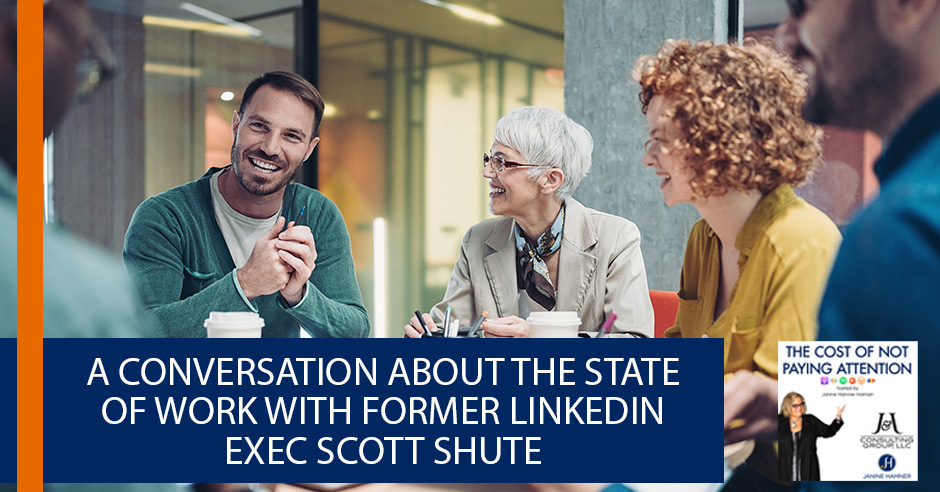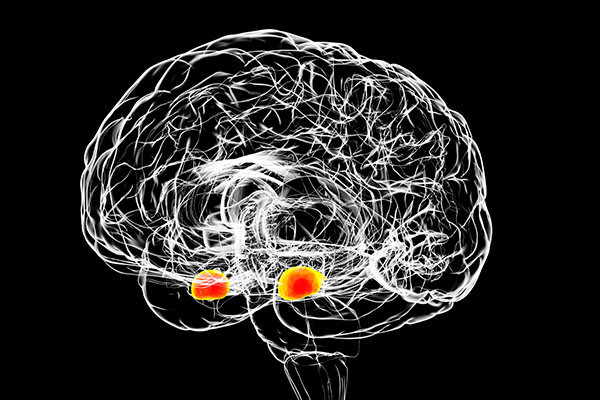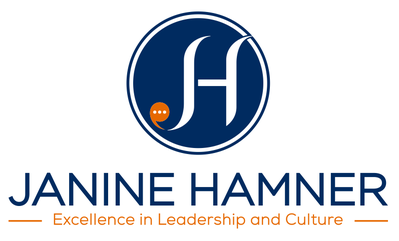
Declining performance. Minimal chances of promotions. Low levels of productivity. Quiet quitting. It’s easy to point out all the “broken things” in the workplace, but how can we overcome them? Isn’t it time for the employer and employees to have the better world of work they deserve? Former LinkedIn executive Scott Shute shares insights about the state of work and discusses his mission of changing work from the inside out. Today’s episode is full of valuable insights, exclusive tactics, and honest perspectives. Tune in to learn how to build a world of work where everyone can thrive and be happy!
GUEST: Scott Shute | LinkedIn | Visit their website: www.scottshute.com
HOST: Janine Hamner Holman | [email protected] | LinkedIn, Facebook, Instagram, and Twitter
—
Listen to the podcast here
A Conversation about The State of Work with Former LinkedIn Exec Scott Shute
What am I paying attention to now? How fast and how easily so many of us can get thrown into some version of, “I’m not (fill in the blank) enough.” Some of us have, “I’m too (fill in the blank),” but many of us have the default, “I’m not (fill in the blank) enough.”
Let me give you an example. I received a bill from the City of Los Angeles. I don’t live in the City of Los Angeles and I have a client who is in the City of Los Angeles, the Port of Los Angeles. When you have a client that’s in the City of LA, whether you live there or not, you get to pay taxes to the City of Los Angeles. The bill was for $2,300.
I was entirely sure that is not what I owed, but it also came on top of another bill that I got from the California Franchise Tax Board. Here in Southern California, we have fabulous weather and we get to pay a lot of money. That bill, I did owe and included in that bill from the California Franchise Tax Board was penalties and fees because I had been naughty. I had been very late in paying for something.
The thing is, in my opinion, it should have been the job of my accountant to say to me, “You need to pay these things and you need to make sure that you’ve got enough money tucked away,” because I’m doing all the things that I’m doing making the world of work be one in which everyone can thrive. I’m not paying attention to when I have to pay $800 to the California Franchise Tax Board in order to have a business in the State of California. I then got this other thing from the City of Los Angeles.
This immediately threw me into thinking, “I am not a good business owner.” I know I’m a good consultant. I know I’m good at the things that I do, but I started to telling myself, “I am not a good business owner.” It took me out for a couple of hours until finally, I decided to get out of my little pity party and I reached out to a friend who I knew would pull me back, which she did. It’s so common, especially now with all that we’ve all been going through over the last few years. I still often give this example, that what used to be that baseline for many of us was maybe in the middle of your chest. Something would happen and your baseline would get elevated. and then you’d return back to where you are. For so many of us now, the baseline is in the middle of our forehead. Something happens and we are immediately underwater.
That is not a powerful place to be and we need to find our way out. I am on a mission to have the world of work and be one in which everyone can thrive. Today’s guest, Scott Shute, is on a mission to change work from the inside out. How great is that? He is an Award-Winning Author and a former executive at LinkedIn.
He’s living at the intersection of the workplace and ancient wisdom. He blends his experience as a Silicon Valley Executive with his lifelong practice and passion as a wisdom seeker and a teacher. When he was at LinkedIn, he was the Head of Mindfulness and Compassion Programs. I have to say, I love that an organization like LinkedIn has someone who is the Head of Mindfulness and Compassion Programs.
Scott has been a pioneer in workplace mindfulness programs, and in advancing discussion around compassion in the context of work. He’s the author of an award-winning book called The Full Body Yes. He also has a great TEDx Talk about all of us continuing to move through COVID and all of the challenges that we’ve all been presented with. With all of that, welcome to the show, Scott.
Thanks very much. I’m glad to be here.
You’re so welcome. I’m thrilled to have you.
It’s my pleasure.
Scott, as I begin most of our episodes, what is something that you have become aware of that people are not paying enough attention to either consciously or unconsciously? What is the cost of not paying attention?
It’s almost like we’re not paying much attention to all. You could put most things in that bucket.
It is unfortunately true.
We’re paying attention to Game of Thrones, the next version, all the content, the news, and sports. What we’re not paying attention to is each other. How many times are we looking into each other’s eyes and taking time to calm down and be aware of another person, how they’re feeling or how they are? I think that oftentimes, we’re not aware of ourselves. We’re not paying attention to ourselves, which means we’re not paying attention to other people.
Often we're not aware of ourselves. We're not paying attention to ourselves, which means we're not paying attention to other people. And what's the cost of that? It's our happiness. It's our sanity. It's our level of fulfillment in life. Share on XWhat’s the follow-up? What’s the cost of that? It’s our happiness. It’s our sanity. It’s our level of fulfillment in life. It’s interesting. Do this for a second. Don’t answer out loud, but think about what makes you happy. There’s interesting research that the act of being fully present is twice as big a factor in your happiness as the thing you just thought of.
That makes sense.
Think about your hobbies. We love our hobbies so much because we get lost in them. We’re fully present when we’re knitting, crocheting, mountain biking, or golfing. We’re fully present and that’s partly why we love our hobbies so much. It’s because we’re right there. We’re not thinking about work or the time we got bullied in high school or whatever. How often are we paying attention to ourselves and being fully present with ourselves, therefore being fully present with our loved ones or anybody around us?
Let’s make the connection between that and how infrequently we are fully present. What’s happening now in the world of work? There have been many articles about people not being fully engaged at work and quietly quitting. There have been articles for decades about opportunities to get people to be more engaged at work. When you think about this perfect storm, we’re neither fully engaged in our lives and not surprisingly, we’re also not fully engaged at work.
What are some opportunities for us to get more grounded and more present?
It’s easy to point out all the broken things. Let’s not do that. Everybody can figure that out. We live it. Both in our personal lives and at work, I think it starts with purpose. If someone is at work and they don’t know why they’re there, and they’re not connecting the dots to the role of why their life is important, that’s the problem.
For me, at work, it starts with the leader of an organization or a leader of the team declaring the mission and vision of the company, “Here’s how we make a difference in the world.” If I start to break it down, then at the team level, we can have a conversation about, “How does our marketing, accounting, engineering, or HR team help make that difference in the world?” What we’re after is at the individual level, how does the work that I do connect to making the world a better place?
One of the most frightening statistics to me, this is from a poll the CDC does almost daily, is that about a third of us in America suffer from symptoms of anxiety or depression. What’s even scarier is that one in nine, or 11%, in the last 30 days seriously considered taking their own life. That cuts across genders, classes, and everything. It’s all of us.
For me, it starts with purpose. If somebody is just grinding, and they feel like, “I’m just a cog in the wheel,” then they start to feel not great. They start to feel like, “My work doesn’t matter,” which means “My life doesn’t matter.” The opposite is true. If I know why I’m there and I know how I’m making a difference, then my life has meaning. My life work has meaning.
There’s something interesting. Some people will say, “It’s easy to say for a doctor or a nurse who is saving lives or a teacher who is shaping the next generation of learners”. My counter to that is everyone has a role. I’ll give you an example. My friend, we’ll call her Connie. She does technical services for a company that makes parts that go into systems, that go into bigger systems, that get sold into medical equipment or industrial equipment. This is the least sexy type of industry if we had to make one up. I have nothing against what she does. If you start to think, “How am I changing the world?”
How am I making the world a better place?
Remember, Connie does technical support. She’s says, “My mission is every day, I deal with 30 to 60 people. They’re not calling to tell me how much they love our company. My mission is that every one of those people will walk away feeling like the interaction they had with me was the best thing that happened to them that day.” That’s awesome. That’s something every one of us could choose to do.
I love that. One of the previous episodes is with Jay Steinfeld, the Founder of Blinds.com, which became the biggest blinds company providing window coverings in the United States.
He went through a personal tragedy. His wife passed away which put him into a period of self-reflection. He realized the way that he was running his company and showing up at work. He admits he was pretty much a tyrant. If people didn’t do something 100% he wanted it done, he yelled at them. He realized that that’s not who he wanted to be. That’s not how he wanted to show up. He changed the mission of the company to have its people be the best version of themselves that they could be.
It’s the difference between that versus if the CEO is on stage talking about how much money they are going to make this year. At the end of it, it’s fun to be on a winning team for a while, as long as the team is winning, but it’s not very satisfying. Who cares if our company made $100 million or $1 billion or $10 billion?
What difference does that make?
It goes back to purpose. It starts with a purpose if we’re laying the groundwork for what we can do.
For example, I’m working now with a trash company. They’re the guys who come out in the morning and pick up your trash. We’re having a conversation about, “What is the mission of your company?” It’s a family-owned business. Three generations now of this family running this business. They care a lot about the environment and they care a lot about their people.
We are in the process of redoing their mission, vision and values. We’re taking the next step to work with all of their employees, about 400 employees, on this is the organization’s mission. What’s my mission? What are my values? How do they connect to that? That’s part of how we get people excited about coming to work.
It is when they get to feel great about, “I’m at an environmental services company. I’m not at a trash company. I’m at a company that is working to take the resources that we are generating.” You and I live in California. We are now on a big kick to recycle food waste and turn that back into energy. It’s part of the energy independence movement. When you can think of yourself as part of that as opposed to a company that picks up trash, that’s a totally different frame.
All of these are personal choices. Certainly, it can help the environment, but it’s a personal choice. Here’s another one. I like to think about and point out how essentially, we are mammals. As humans, we are mammals first and we see it. The easiest example is our fight-or-flight systems. We get triggered by something that happens and we’re angry. We’re in this phase where we’re ready to kill something or ready to run. Our bodies are flooded with cortisol and adrenaline. It’s because our amygdalas, these two-little almond-shaped clusters in our brains are always looking in our life for what might be dangerous.
We evolved this way. That was awesome when we were living out on the Savannah and we needed to protect ourselves, but we are not evolved to handle our modern life. We end up getting angry, frustrated, flustered or whatever. It’s easier to see on the physical side. The counterbalance to that is you take a deep breath, meditate or go for a walk. We’ve all heard this stuff, but it works with our minds as well.
What I mean by that is those amygdalas are always looking for what is wrong. They’re not looking for what’s right. They’re looking for what’s wrong because they’re trying to keep us alive. Here’s the thing, alive is a pretty low bar. We have evolved to stay alive, but is anybody satisfied with just being alive? I call this pothole management.

Thriving workplace: The amygdala is always looking for what is wrong. It’s not looking for what’s right in our lives.
You can think about it like this. There can be a thousand miles of perfect road. Our life is like this. A thousand miles of perfect road and there’s one pothole. This is where we spend 99% of our mental capacity. It is thinking about that one pothole. It happens in our relationships. You think about your mother, your kid, your spouse or whatever.
We think, “Oh no!” when they do that one thing. We don’t think about the 99 things that we love. We think about the one thing they do over and over that makes us crazy. We think about it in our performance reviews. At work, we can get a performance review every six months or year, five pages of amazing things I did last quarter. Three bullets of things I might want to look at for next time. I fixate on the three bullets.
All you’re going to focus on are those three bullets.
The first step is to realize, “I’m a mammal. I’m fine-tuned over millions of years.” Not just the time that I’m alive. Millions of years of evolution have finely tuned my negativity bias. The first step is to realize this and say, “I’m trying to be an evolved human.”
What would an evolved human do?
We’re evolved human beings. It’s to ask ourselves, “What else is true?” If we think about our spouse, our kid, our boss or whoever, it’s like, “What else is true?” We have a long list of things that are great, but we tend to fixate on what’s broken. What are we not paying attention to? We’re not paying attention to the 999 miles of perfect road in our life. The news is a millionth of a percent of what’s wrong. The news is our collective amygdala. This is not reality. It’s not the reality. It’s a tiny portion of reality. It’s depressing to look at the news.
When we think about our spouse, our kid, or our boss, we have a long list of things that are great, but we still tend to fixate on what's broken. We're not paying attention to the 999 miles of perfect road in our life. Share on XThe counterbalance is, what else is true? What else is true is there are a lot of people who are not at war. There are a lot of people who have clean water to drink and they’re safe. They’re happy. There are birthday parties and weddings and good stuff happening now just like all this other nonsense is happening. The thing is I’m not saying to ignore the pothole, especially at work. We get paid to fix the pothole, but let’s not spend 99% of our lives fixated on what’s wrong. Let’s also take time to celebrate what’s going well.
I love that. I believe and I’m getting very clear that you believe as well, how our life goes is our mindset. There’s this idea that we are all supposed to be striving to be happy. Personally, I feel like that’s a nonsensical idea. Everybody is sitting around, being happy, and singing Kumbaya. We’re not getting very much done in that world. I want to be challenged, fulfilled, engaged, and empowering other people. I don’t want to just be happy. Happy for me is a passive thing. Joy for me feels much more active.
I prefer the word joy because I do believe joy comes from the inside out.
Much of it is about what we choose to focus on, whether or not we’re going to focus on the pothole or the 999 other great miles that we got to travel. I remember I was on an amazing trip, around a decade ago, with one of my very best friends. We were in Kauai and we were on this incredibly bumpy unpaved road, and we were bouncing all over the place. We’re laughing because it’s ridiculous. There were potholes as big as the car.
The only thing to do was laugh. I said, “The only thing that would make this worse/better is if there were another car behind me trying to get me to move faster.” At that moment, another car appeared behind me. There was no place to go on the road. The road was big enough for one automobile. We just laughed even harder.
That’s one of those situations where we could have been entirely on the other side of the spectrum. We could have been pissed. We could’ve been worried about what was going to be happening to the suspension of the car. This was a rental car. One might think, “Am I going to end up having to pay for a new suspension for this car? I’m on an unpaved road, probably not where I’m supposed to be anyway.” Instead, we found joy and happiness because of where we decided to put ourselves.
It’s a choice. One of my favorite quotes is from Mark Twain, the humorist from the 19th Century. He says, “I’ve lived through some terrible things in my life and some of them happened.”
I used to play more golf. My son was on his high school golf team. We played more and I discovered that it was important for me to keep score in a different way.
Here’s the thing. I’m an okay golfer. No matter how good you are at golf, there are times when you hit shots that are insanely bad like you’ve never played before bad. I would find myself super frustrated and super pissed off playing golf. I stopped. I thought, “What is happening here? This is Sunday afternoon. I’m out with my son or my buddies. We paid a lot of money to be here. We’re out here to have fun. The entire purpose of this activity is to have fun and here I am being super mad.”

Thriving workplace: No matter how good you are at golf, there are times when you hit shots that are just terrible.
I thought, “That is very strange. What is causing all this anger?” It’s the denial of my expectations. I feel like I should be playing so much better. Am I practicing that much? Do I deserve to play like a pro golfer every shot of every game? Instead, I tried to have a different scoring system, which is the smiley face system. Have you ever seen in the airport this little machine? It has 3 or 4 buttons. There’s a green smiley face, yellow middle face, and red frowny face if they want to know what your experience is like with the toilet or with whatever.
Also, at the doctor’s office. It’s like, “How are you feeling on the spectrum?”
You can push a button. I’m like, “Keep it simple.” I thought, “I’m going to keep score this way.” The score is not how many strokes it took to finish the whole. The score is, “Am I happy?” My goal in playing golf is I want at least 16 out of 18 holes to be smiley faces. I’ll give myself two yellow faces as a buffer.
How did it work?
It works great because if you’re scoring like that, you’re sitting on the tee. If I shank one, I laugh at everybody. My buddies know this and they’re like, “Red frowny face.” I’m like, “Look, see. They’re smiling.” I take them all again. I’ll hit it again and whatever. If that’s your goal, then I approach the game in a totally different way than if I’m trying to shoot an 85 or a 92.
I love that perspective. I have played golf several times in my life. Surprisingly, I’m not particularly good at it, but one of the things that I love about golf is the idea of a mulligan or a do-over. How many times in life would it be great if we said, “I’m going to take a mulligan on that. I’m going to do that again. I didn’t say that the way that I wanted to. I had a mindset that was not productive in this conversation. I want to do this over again.” I’m working with a very large organization. Their leadership team came together during COVID, and they’ve never met in person.
A year later, they have still never met in person, so they don’t have trust. They don’t have comradery. They don’t have a great team spirit because they’ve never figured out how they are going to work together and how they are going to be a team. As you and I know, we have this idea that trust is a fixed thing. Scott, you and I have trust, or you do me wrong and I have to X you out of my life. We have no more trust.
When we think about those relationships in our life that last a long time, trust gets broken and repaired all the time. With the relationships that are important, our parents, our kids, our partners, our spouses, our friends, where the relationship is the strongest is often in those places where there was a break.
Sometimes the break is something little. I forgot to let my husband know that I have an evening event, a reception that I’m going to be going to. It means that I’m going to be getting home late. I was like, “Honey, we need to plan on a late dinner if we’re going to eat dinner together or you’re on your own.” We have an agreement that I fill him in on those things and I did not. I broke trust. All I will need to do to repair it is to call him up and say, “Honey, I am so sorry. I own that I did this thing,” and here’s the reality, “Do you want me to bring home dinner? Is there anything you want me to bring that’s special?” It’s not a big deal but, “Is there something I can do to make this a little more awesome?”
We forget in these relationships that we are not paying attention to what the cadence is because for so long, we’ve largely been isolated in our little bubbles. Our amygdala has this illusion like, “My husband and I are going to get married, and then we’re going to live happily ever after.” Bullshit. Whoever invented that idea? Whether it’s your boss, or who is accountable to you, or a coworker, these relationships take work.
We want all of our relationships magically to be holding hands and skipping down the lane, and that’s not how it goes. We forget that we need to invest our resources. Time, energy and money are the only resources that humans have. We need to invest those resources in having those relationships be rich, fulfilling, and meaningful.
It reminds me of a story. I forget where the story came from. It’s old-school. These people were older. When they got married, the man at the time said, “I’m going to tell you that I love you today and this will be the last time because you should know it after that.” It’s like, “No, this is not how it works.” That was his expectation of 50 or 60 years of marriage. He only needed to say it once.
Going back to awareness and the things we’re not paying attention to, it’s awareness of other people. There’s maintenance required, especially with our close ones. We believe that because we’re married or because you’re my mom or because you’re my kid, I don’t have to do X as much as I do with other people. It’s the opposite. We need to invest. We need to be aware. We need to be paying attention to the people who are most important to us.
We need to invest, we need to be aware, and we need to be paying attention to the people who are most important to us. Share on XI know you have launched a new website. I would love for you to tell us about it.
My mission in life is to change work from the inside out. This website is called ChangingWork.org. This thing we’re building is designed for teams. What we’re trying to solve for is engagement. Gallup does these surveys all the time. The latest I saw was only 21% of employees are engaged, which is sad to me. Meaning 79% of people are feeling not engaged. That’s terrible.
I’ve worked on some amazing teams in my career. LinkedIn has an amazing culture, and other places I’ve been in. What we’re doing here is a curation, let’s call it the greatest hits I’ve seen happen in teams. The idea is that if a manager and their team can spend twenty minutes every other week for a quarter, they can make a real difference in their team. You can go to the site to learn more but that’s the basic idea. It’s to change work one team at a time, and change work from the inside out.
As we start to think about wrapping up today, as you think about changing work from the inside out, and as you think about what else is true, is there someplace where you would love to leave our audience?
I think it’s uncomfortable for a lot of us, but it’s when I’m unhappy or I want more out of life, I need to look in the mirror. It’s super uncomfortable because we love to find somebody else there. This is their problem.
“It’s your fault that I am miserable.”
I got that, “Boss, we have this environment or the commute.” I would say, “Look in the mirror.” It starts with my friend, Connie. She could have this approach that she’s just a cog in the big wheel but no. She says, “My job is to make everybody light up around me.” If each one of us could say, “First of all, how do I light my own light? How do I shine that light brightly? If that’s all I do, fantastic.” That’s all any of us need to do.
I think our most important mission, each one of us, is our own development. You could call it consciousness. Whatever you want to call it. Shining your light brighter. That’s what it is for me. When we do that and when we shine our light brighter, not only do we figure out a way to solve our own problems but we make our world a better place because people react to us in a different way than if we’re going around as a big ball of misery. It starts in the mirror.
I love that when we’re walking around like a big ball of misery, people react in a certain way. As much as we would like to, we cannot change anybody except ourselves. We would like to say, “All right, my child, my spouse, my partner, my boss, here’s what you need to be doing. If you did what I said, your world would work out great.” That’s not how it goes. When we show up differently in a mind space of curiosity, enjoyment, having our own light turned on, and being conscious and present, other people start showing up differently. They may or may not be doing anything differently, but they occur to us differently. The longer that goes on, things start to change.
It starts from the inside out. There’s no way around it.
Folks, get out your mirror. It’s so true. One of the things that I know is true, being the age that I am which is likely similar to the age that you are, looking back on my life, the points that have been difficult and painful where I needed to look in the mirror have been the points of the greatest breakthroughs that in the end, created the most joy and fulfillment. They suck when I was in the middle of it. It’s making that first step to look in the mirror and figure out, “What am I doing that is contributing to this?” It’s never easy and, whatever your thing is, candy, ice cream, or sunshine and rainbows, they’re always at the end of that journey.
Here’s the mic drop quote for what you’re saying. If you’re going to go to hell and back, don’t come home empty-handed.

Thriving workplace: If you’re going to go to hell and back, don’t come home empty-handed.
I love it. That’s exactly how it is. When we go through hell or those hard times, we come back with something if we’re paying attention. We have the opportunity to come back with something.
Scott, this has been a delight.
It’s my pleasure. Thanks for having me.
Thank you so much for sharing with us your wisdom, experience, expertise, humor, and your great pithy of what else is true, look in the mirror, and come back with something from that trip through hell. I’ve enjoyed this and I know our audience has as well.
Thanks very much.
This has been the Cost of Not Paying Attention. Remember, great leaders make great teams. Until next time.
Important Links
About Scott Shute
 Scott Shute – Award-winning author, Former LinkedIn Exec
Scott Shute – Award-winning author, Former LinkedIn Exec




